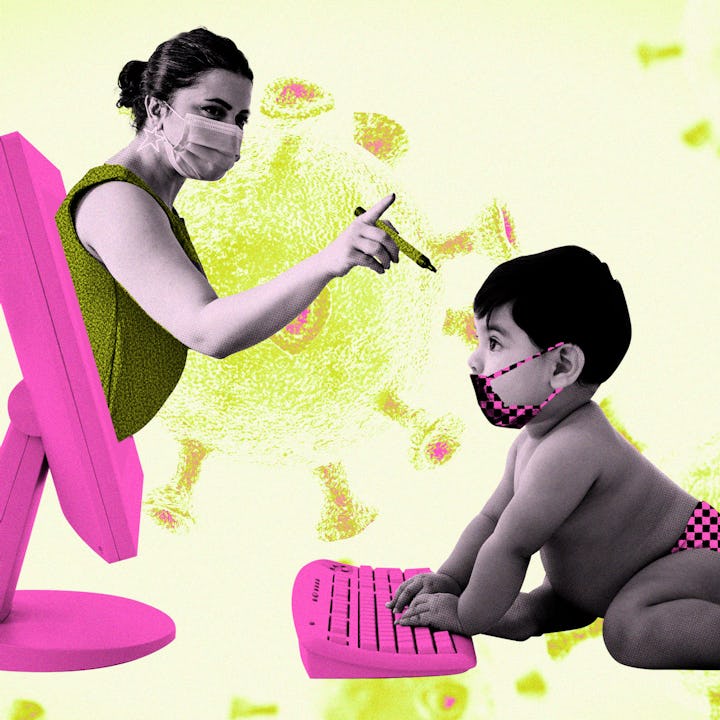What Will COVID Babies Be Like In Kindergarten?
Remote learning might be in the rearview, but that doesn't mean everything's in the clear.

It's been three years since COVID was declared a worldwide pandemic, and by now, things have gone back to some alleged version of "normal," culturally and socially. But when you have kids, there really is no such thing as normal — the unprecedented global events of the past few years have undoubtedly impacted kids of all ages, both physically and emotionally, in ways large and small.
Babies born at the start of the pandemic are now full-blown toddlers, which means they're likely entering their first years of school. And those who were toddlers when the world suddenly changed are now kindergarteners, having experienced the world exclusively from a lens of remote learning, mask-wearing, and uncertainty that is tough for little minds to adequately process. That's without mentioning the ripple effects from secondhand stress they've absorbed from parents and caregivers, who have had to navigate job loss, financial strain, grief, and health changes, both related to the pandemic and otherwise.
It will likely take years for health experts to determine the true impacts that COVID and its ripple effects have had on young children. However, research so far shows that the "COVID generation" is already experiencing developmental delays and behavioral concerns. But if you're a first-time parent (and even if you're not), you might be wondering what the next phase looks like — socially and developmentally — for your little ones as they navigate life outside a pandemic bubble.
Do experts think COVID babies will be affected socially?
Here's the blunt truth, per a pediatrician: There are definite behavioral and developmental concerns that kids born during or even a couple of years before the pandemic began will experience, as Dr. Hansa Bhargava, WebMD contributor and chief medical officer at Medscape Education, tells Scary Mommy.
"The first three years of a child's brain development depends a lot on socialization with others, especially for language and social skills," says Bhargava. Due to many factors (including less social interaction, more screen time, and parental stress), many toddlers and young children are delayed in many parts of their development. This often manifests itself in difficulty with communication and the ability to be social with others, adults and kids alike."
That could translate to fearfulness of people they don't know or recognize, or standoffishness in crowds or group settings. "Because they didn't see many people, they may have anxiety in group situations such as childcare settings and preschool," adds Bhargava. For children whose early socialization came primarily through Zoom learning, concepts like sharing, taking turns, and conflict-solving might require more time and patience to tackle.
What about developmentally?
Bhargava notes several developmental concerns among the COVID generation as they grow into toddlerhood and beyond. "From birth to age three, language is a significant area of development, and the brain depends on hearing lots of words and conversations to develop this area," she says. "For babies who were isolated from family, friends, and others, this could result in fewer words, less sentence formation, and less ability to understand people talking around them. In turn, this can lead to frustration for the child, which can result in outbursts, tantrums, and acting out."
Toddler meltdowns are expected (and generally NBD), but it can be understandably frustrating for a little one whose exposure to the world around them went from next to nothing to full-throttle very quickly.
Bhargava adds that "a typical 3-year-old should be able to form three-word sentences, use some descriptive words and pronouns, and say about 200 words, but kids who were isolated during the pandemic may not be able to do that." For children who might not yet have the words to describe what they're feeling or striving to say, parents might notice their child has difficulty handling their emotions, or they may even exhibit physically aggressive behaviors, such as biting, hitting, or kicking.
A study published in JAMA Pediatrics in 2022 concluded that children born in 2020 are now scoring lower on average on tests of gross motor, fine motor, social, and problem-solving skills compared with those born before COVID-19 — though it's worth noting that the sample size was small, following 255 infants up until six months.
Where do we go from here?
Though this all sounds pretty bleak, Bhargava reminds us how resilient kids are, and you can help your child through these tough times in small, manageable ways. "The good news is that the brain, especially a child's, can change and adapt quickly," she says. "Reading to your child, talking back and forth with them, and exposing them to new social situations will certainly help."
And even though the markers of the pandemic (including endless screen time, staying six feet apart, and only seeing the top halves of faces) might be in the rearview, the inequities faced by American families that COVID laid bare are still alive and well. Not every family has access to vital childcare resources, including counseling, speech and language therapy, and regular check-ups, and these devastating economic disparities have only been exacerbated in recent years.
"If parents are worried that their children are not understanding language well, are not speaking enough, are anxious or acting out in social situations, certainly speak to your pediatrician or a school staffer — they can recommend other help if needed, such as speech and language therapy or other mental health services," says Bhargava. No matter what's going on, there's zero shame in asking for help as you support your little one, and you're far from alone.